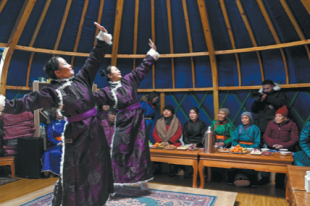All the world's a stage


Typically, each troupe is small, consisting of about a dozen versatile members, all skilled in various forms of entertainment. In recent years, these troupes have extended their reach, performing for bedridden seniors in nursing homes, staging shows in communities about fraud awareness, and visiting border outposts to boost the morale of young soldiers.
"As long as the audiences need us, we will continue our service," Xing says.
Bao Rui joined Xing's troupe after graduating from college in 2016. She enjoyed the feeling of being needed by the audience, and the genuine connection that comes from direct interaction with people.
Unlike large crowds for which actors perform on grand stages, her audience sometimes consists of just a handful of people. "Even if there's only one person, we must see the performance through to the end," she says.
The 30-year-old can dance, host shows and play instruments. She once danced for an elderly bed-bound woman in a nursing home. After watching her performance, the elderly woman held her hand and kept thanking her with tears in her eyes.
The troupe members frequently travel to perform in distant villages. On their way to a performance once, their bus passed a herdsman whose truck had overturned, scattering his horses. They stopped to help, with some rounding up the horses. Having grown up in pastoral areas, these ethnic Mongolian actors are adept at setting up tents and herding horses.
When they perform in villages, they often find that many of the residents are elderly, as the younger generations have left for work in cities. People ask the actors to help them fix their mobile phones and appliances, and sometimes they even assist in setting up tents.
"All these experiences are interesting, although sometimes the conditions are hard. I feel closely connected to the lives of my audiences, and their stories inspire us to put on good performances," Bao says.
Many ethnic groups, including Mongolians, Ewenki, Daur and Oroqen, make their home in this vast grassland expanse. The troupe weaves the distinctive stories and traditions of each group into its performances, a creative endeavor that has earned it numerous awards over the years.
Guo is a member of the Daur ethnic group. Over the years, she has learned several languages through her performances.
"Speaking in the local language helps close the distance with them quickly. It also enriches my own artistry," Guo says.
She grew up in a yurt in the pastoral areas of eastern Inner Mongolia. From childhood, she watched performances by Ulan Muqir troupes, which planted the seed in her heart to one day join them.
"I was touched by their desire to perform for people in need. It's important that this spirit is kept alive and passed down through generations of people living on the grasslands," she says.
Contact the writer at dengzhangyu@chinadaily.com.cn





































